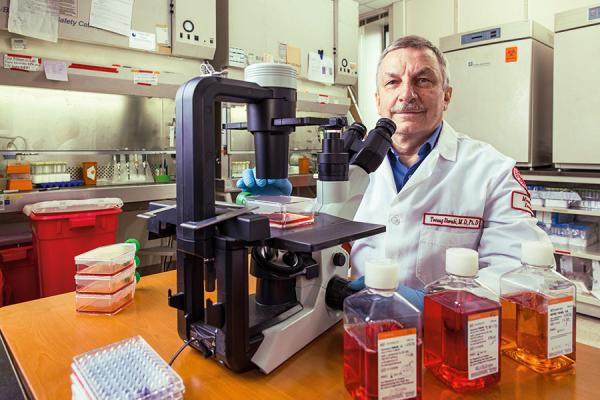Star Wars Against Cancer: Attacking the Clones — Novel Strategy Could Mean More Durable Treatment for Leukemia

Scientists at the Fels Cancer Institute for Personalized Medicine and the Department of Cancer and Cell Biology at the Lewis Katz School of Medicine at Temple University and Fox Chase Cancer Center have developed a novel therapeutic strategy that attacks and destroys leukemia clones, an approach that could potentially prevent patients from relapsing after treatment.
Senior author Tomasz Skorski, MD, PhD, DSc, and his research team had previously reported that acute myeloid leukemia (AML) cells accumulate high levels of metabolically induced DNA damage. To survive and proliferate, malignant cells must repair these DNA lesion, which make them vulnerable to DNA damage repair inhibitors (DDRi).
In a new study, the researchers identified a combination of two DDR inhibitors that was effective against all cancer clones, making treatment more durable. The findings are significant because the approach could be applied not just to leukemia, but to other types of cancer.
“What’s new and paradigm-changing is that we are saying you have to identify all of the clones in the patient before treating the cancer,” said Skorski, Director of the Fels Institute and a Co-Leader of the Nuclear Dynamic and Cancer Research Program at Fox Chase. “Once you know the clonal composition of patient’s cancer, then you can plan the successful treatment.”
In recent years, “personalized medicine” has focused on using genetic testing to tailor treatments to each individual’s specific cancer type, making treatment more targeted and effective. However, even with this individualized approach, the majority of patients with AML eventually relapse. One reason this happens is because of clonal heterogeneity of the leukemia in patients. While treatment may eradicate the most abundant types of AML clones, minor clones survive and regrow.
For the study, researchers first used single-cell DNA sequencing to screen AML patient samples and identify the clones. To complete the sequencing, researchers partnered with Amy J. Goldberg, MD, FACS, to establish the Fels Single Cell Multiomics Facility. Goldberg is The Marjorie Joy Katz Dean at the Katz School of Medicine.
The new facility, which is now available to other researchers, includes a platform capable of running single-cell genetic sequencing and proteomics, a device capable of running transcriptomics alone or in combination with proteome analysis, and a genetic sequencer, said Monika Toma, PhD, the study’s first author and the facility’s head.
Skorski’s group then tested the response of AML clones to different DDRi. Based on these results, they identified a mixture of inhibitors that were effective against all leukemia clones in a patient sample. When used in combination, the drugs succeeded in eradicating all malignant clones, both in a laboratory test and in mice.
“We evaporated human leukemia in mice,” Skorski said. “We’re really hoping that this will be the first step for the field to shift from personalized medicine into clonal medicine. We think if we combine our approach with standard cytotoxic drugs, we will be able to lower the doses of these drugs, reducing toxicity for patients and achieving an even better effect.”
Next, the researchers are planning to apply single-cell “multiomics” approaches to monitor patient responses to treatment during the clinical trial, with patient recruitment expected to begin at Fox Chase in the coming weeks.
Researchers also worked with Adam Karami, MS, head of bioinformatics at the Fels Institute. Karami predicted that after acquiring information about clonal response from multiple patients, the research team will be able to apply machine learning/artificial intelligence to predict patients’ clonal response to the drugs without running laboratory tests.
“We are at the beginning of this highly translational approach that allows us to go from patient to discovery and back to the patient again,” Skorski said. “This is the frontier of cancer treatment.”
The study, “Clonal Medicine Targeting DNA Damage Response Eradicates AML,” was published in Blood.
